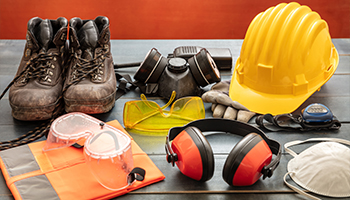
Every day on the jobsite, you want to work smarter and more efficiently. But working safely is most important. As an HVACR technician, you frequently work around hazardous chemicals, near exposed wires, in poorly lit spaces, up on ladders and around heavy equipment. Here are a few HVACR safety tips to make sure you always make it back home at the end of a long day.
Plan pre-emptively.
For starters, give yourself enough time to do the work. Many HVACR installations are done under tight deadlines in order to meet customer needs. During busy seasons, schedules can often be grueling with back-to-back maintenance calls that don’t allow much wiggle room for unforeseen delays in between. It’s tempting to rush through the job or make up time by driving unsafely to your next one. With that in mind, be sure to schedule enough time between appointments so you aren’t rushing to finish the job or to make your next call. Safety on the job site starts before the work even begins.
Pack water and listen to your body. It is probably safe to say you’re working year-round, including summer, which means you’re in tight, stuffy crawl spaces or on rooftops at the peak of the afternoon heat. Remaining hydrated is key for just about anyone, but especially critical to those who are exposed to extreme heat as these elements can pose threats such as heat stroke and exhaustion. Be sure to remain hydrated and take breaks when needed.
Proceed with caution.
When you’re on-site, there are many ways to reduce your risk of an accident. For one, treat every exposed wire as live and handle each wire and cable accordingly. Before working, remember to turn off the power at the breaker panel, and don’t forget to follow procedures by locking-out and tagging each circuit to stop anyone from turning on the power.
If you’re servicing a unit that has recently been operating, some components could still be extremely hot – even in an air conditioning unit, so be cautious. Check the temperature of each part before performing any work to ensure that it has had enough time to cool down.
Prep your gear.
Working around HVACR chemicals like refrigerants, cleaning liquids, solvents and gases is dangerous and even as we grow more comfortable handling these materials throughout years on the job, it’s important not to grow complacent, and to always remember to treat them with proper care. You’ve already undergone HVACR safety training, so remember to follow all HVACR servicing procedures to stay safe. This includes wearing protective personal equipment (PPE) like safety glasses, protective footwear and work gloves safety-rated for HVACR technicians.
Since we sometimes work in basements and crawlspaces, we risk exposure to everything from molds to bacteria to fungi every time we breathe in. Make sure to wear an industrial grade respirator if you find yourself working in close proximity to these substances for extended periods of time. Also, if you’re working on a poorly functioning or improperly vented furnace, you could unknowingly be in danger of carbon monoxide poisoning. Make sure to take all necessary precautions.
Play it safe from head to toe.
To stay safe, prepare ahead and have all of these protective materials available when you’re on the jobsite. You might not need them to service every customer, but having them available can make all the difference.
• Hard hat
• Steel-toed work boots
• Full-coverage clothing
• Thick HVACR work gloves
• Safety goggles
• Face shields
• Respirators
• Earplugs
Practice safer options.
Large HVACR systems are heavy and moving or installing them is not a one-person operation. Often, cranes or other equipment are necessary to move or lift these large pieces. Follow all safety procedures while working with these.
Every time we’re on a jobsite, keeping these HVACR safety tips in mind can help you, and those around you, remain out of harm’s way.